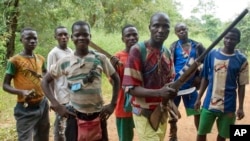GENEVA —
An international commission of inquiry leaves Tuesday for the Central African Republic (CAR), to begin investigating alleged human rights violations by the Seleka and anti-Balaka militias in that conflict-ridden country.
After three days in the capital, Bangui, the three-member U.N. commission will visit the interior of the Central African Republic. During the next two weeks, the commissioners will investigate the scope and gravity of alleged rights violations.
They say they will interview victims of abuse, witnesses to the commission of crimes, political and village leaders; anyone who can shed light on killings, rapes, disappearances, and other abuses against the civilian population.
Commission Chairman Bernard Acho Muna is a lawyer and advocate to the Cameroon Supreme Court. He recently returned from a visit to Bangui, and says there is a total breakdown of law and order in the country.
“When I was there two weeks ago, there was a definite feeling that this must stop and, therefore, the government of transition is emphasizing that we have to put an end to impunity," he said. "But, that is easier said than done... What we can do is make sure that those who cross the red line would be accountable to the international community and would be liable to prosecutions if necessary.”
At the request of the U.N. Security Council, Secretary General Ban Ki-moon established the commission in January for an initial period of one year. Its mandate is to investigate reports of human rights abuses in the Central African Republic by all parties since January 1, 2013.
Commissioner Muna says the commission will explore every avenue of concern throughout the country.
“We have to see the camps where people are interned,” Muna said. "We have to talk to people in the villages. We have to have a feel of the menace that they are faced. We have to have a feel of what they went through. In order to advise the Security Council correctly, we have to know what is going on.”
In recent months, tens of thousands of Muslims have fled their homes in western CAR, fearing attacks by the largely Christian anti-Balaka group.
Muna says he views genocide as a serious possibility and the International Community must not wait until genocide has been committed before taking action.
“My experience in Rwanda shows that genocide starts always with propaganda-convincing the population that this group of people are evil, they are bad, they should be eliminated,” Muna said.
The commission will present an interim report of its findings to the Security Council in June, followed by a final report at the end of the year.
After three days in the capital, Bangui, the three-member U.N. commission will visit the interior of the Central African Republic. During the next two weeks, the commissioners will investigate the scope and gravity of alleged rights violations.
They say they will interview victims of abuse, witnesses to the commission of crimes, political and village leaders; anyone who can shed light on killings, rapes, disappearances, and other abuses against the civilian population.
Commission Chairman Bernard Acho Muna is a lawyer and advocate to the Cameroon Supreme Court. He recently returned from a visit to Bangui, and says there is a total breakdown of law and order in the country.
“When I was there two weeks ago, there was a definite feeling that this must stop and, therefore, the government of transition is emphasizing that we have to put an end to impunity," he said. "But, that is easier said than done... What we can do is make sure that those who cross the red line would be accountable to the international community and would be liable to prosecutions if necessary.”
At the request of the U.N. Security Council, Secretary General Ban Ki-moon established the commission in January for an initial period of one year. Its mandate is to investigate reports of human rights abuses in the Central African Republic by all parties since January 1, 2013.
Commissioner Muna says the commission will explore every avenue of concern throughout the country.
“We have to see the camps where people are interned,” Muna said. "We have to talk to people in the villages. We have to have a feel of the menace that they are faced. We have to have a feel of what they went through. In order to advise the Security Council correctly, we have to know what is going on.”
In recent months, tens of thousands of Muslims have fled their homes in western CAR, fearing attacks by the largely Christian anti-Balaka group.
Muna says he views genocide as a serious possibility and the International Community must not wait until genocide has been committed before taking action.
“My experience in Rwanda shows that genocide starts always with propaganda-convincing the population that this group of people are evil, they are bad, they should be eliminated,” Muna said.
The commission will present an interim report of its findings to the Security Council in June, followed by a final report at the end of the year.




